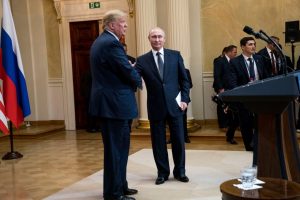 The New York Times
The New York Times

MOSCOW — As President Trump faced fury in Washington for his Helsinki, Finland, performance, including from some fellow Republicans who called his deference to President Vladimir V. Putin of Russia destructive and embarrassing, the view in Moscow was wholly positive.
Little mention was made of the election-meddling scandal that has hovered over Mr. Trump’s presidency. But plenty of attention was devoted to what the official Russian media described as Mr. Putin’s triumph — an opinion shared, for different reasons, by Mr. Trump’s critics in the United States and elsewhere.
Here are some takeaways on Monday’s talks, from the Russian perspective:
Two Types of Presidencies
Mr. Trump’s fumbling responses to questions about the election meddling — and his apparent support for Mr. Putin’s side of the story — hardly caused a stir in Russia’s media, even as they dominated news coverage in the United States.
Mr. Putin is not challenged by Russian journalists and can use the vast state media apparatus to portray himself favorably. Mr. Trump does not have that ability. The difference was stark in Mr. Putin’s authoritative-sounding replies to questions.
“Russian political institutions are very weak and therefore, as president, Putin felt much more confident during the news conference,” said Aleksei V. Makarkin, deputy head of the Center for Political Technologies, a Moscow-based research group. “Putin is only constrained by his own mind-set.”
Welcoming a New Détente
Russian analysts conceded that the meeting offered few concrete agreements or concessions, but most saw the resumption of dialogue as a sign of things to come.
Dmitri V. Badovsky, the head of the Institute of Socio-Economic and Political Research, a pro-Putin research group in Russia, told Vedomosti, the Russian business daily, that the two presidents had “begun to see one another as long-term partners.”
Dmitri V. Trenin, the director of the Carnegie Moscow Center, a research group affiliated with the Carnegie Endowment for International Peace, said that the talks signaled a new point in relations.
“We are exiting a period of ‘no dialogue,’ and Russia is ceasing to be toxic,” Mr. Trenin said. The process will continue if Mr. Trump and Mr. Putin visit each other’s capitals in the near future, he said.
Breaking Political Isolation
Russian analysts, including Kremlin critics, agreed that the meeting had allowed Mr. Putin to show that Russia is indispensable in world affairs — even with the accusations of election-meddling and other rogue-like behavior, including evidence that Russian operatives used a Soviet-designed nerve agent against suspected adversaries in Britain.
“The meeting was valuable to Putin because it showed that despite the indictments and poison accusations, the West is still compelled to speak to Russia and regards it as an important and respectable country,” Mr. Makarkin said.
Domestic Problems Obscured
In March, Mr. Putin won re-election to his fourth term, reflecting his underlying popularity and the inability of political adversaries to seriously challenge him. But now he faces the vexing question of what will be the driving force of his next six years in the Kremlin.
Under the weight of Western sanctions and Russia’s own inefficiencies, the economy has performed poorly since at least 2013. Mr. Putin’s foreign policy adventures, including the annexation of Crimea in 2014 and direct intervention in the Syrian war since 2015, diverted public attention from economic problems — up to now.
Such distractions cannot last indefinitely, however. Despite the public’s pride in a successful World Cup tournament, people’s trust in Mr. Putin has weakened this year, from 57 percent in January to 38 percent in July, according to VTsIOM, the state-run pollster. Many Russians have been angered by a toughening of pension benefits and a tax increase, announced the same day as the opening of the World Cup last month.
Human Rights Sidelined
Since the fall of the Soviet Union, Russian organizations devoted to human rights looked to the United States for guidance and financial support. Over the past decade, the Kremlin has made it difficult for such groups to receive funding from abroad. Still, they would appeal to the White House to support their causes during talks with Russian leaders — demanding, for example, the release of political prisoners in Russia.
The Helsinki meeting was different. Many rights groups do not see Mr. Trump as an ally. And their low expectations that he would raise human-rights issues with Mr. Putin appeared to be well founded. Some did not even bother to make an effort.
“This time around, unlike with the previous U.S.-Russia summits, Human Rights Watch did not publish a news release or address the White House with specific human rights asks on Russia,” said Tanya Lokshina, the organization’s Russia program director. “Under present circumstances, we decided against it.”
Follow Ivan Nechepurenko on Twitter: @INechepurenko.
Andrew E. Kramer and Lincoln Pigman contributed reporting from Moscow.



